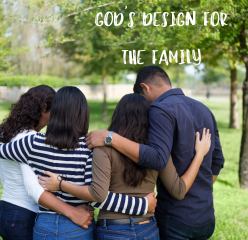The importance of the family to society is often overlooked or undervalued. It sometimes seems as though the world is unsure of the purpose of family. Perhaps it is necessary for us to look into God’s design for family.
In this article, we will be considering what exactly it is that God intended for the family. What is God’s design for family? Maybe looking at the very first family in the Bible will give us some clues.
The first family in the Bible
The first family in the bible was Adam and Eve’s family. Together, and according to the Bible, they had three sons – Cain, Abel and later, Seth.

Adam and Eve became the first parents, and their children, Cain, Abel, and later Seth, were the first siblings. Their family dynamic was marked by both love and tragedy. Cain’s jealousy and anger toward Abel led to the first recorded murder in human history.
The disobedience of Adam and Eve had far-reaching consequences for their family and all of humanity. It brought about a separation from God and introduced suffering, toil, and death into the world.
Despite the Fall, there is a glimpse of hope and redemption within the first family. God showed mercy to Adam and Eve by providing them with clothing and promising a future offspring who would ultimately crush the power of sin (Genesis 3:15). This promise foreshadows the coming of Jesus Christ the ultimate Redeemer.
The story of the first family serves as a lesson about the importance of accountability and taking responsibility for one’s actions. Adam and Eve faced consequences for their disobedience and Cain faced judgment for killing his brother.
The story of the first family in the Bible provides valuable insights into human nature, the consequences of sin and the need for redemption. It sets the stage for God’s redemptive plan through Jesus Christ, who offers hope and restoration to all humanity.
God’s purpose for family

- Companionship and Love. One purpose of family is to provide companionship, love and support. Family is a sacred bond that fosters emotional connections, unity and a sense of belonging.
- Procreation and continuation. Family is connected to procreation and the continuation of human life. Through the family unit, individuals can participate in the divine plan of creating and nurturing new generations.
- Moral and spiritual development. It is within the family that values, ethics, and spiritual teachings are passed down from one generation to the next. Parents are responsible for guiding and raising their children in a way that promotes righteousness, compassion, and spiritual growth.
- Mutual support and care. Family is a place where individuals are meant to support and care for each other. It provides a framework for mutual assistance, protection, and nurturing. This includes not only immediate family members but also extended family networks that can provide a broader support system.
- Reflecting God’s image. The family unit reflects the image of God. It is a microcosm of divine relationships. Family mirrors and manifests divine attributes in human relationships.
God’s design for family is made clear in the lessons we gain from looking at the first family.
The first family’s experience reminds us of the importance of prioritizing God’s presence in family life. Before their disobedience, Adam and Eve had a close relationship with God, walking and talking with Him in the Garden of Eden. Families are called to seek God’s presence, cultivate a spiritual atmosphere, and centre their lives on Him.
Effective communication and accountability are essential in families. After Adam and Eve sinned, God held them accountable for their actions and engaged them in dialogue (Genesis 3:8-13). Open and honest communication within families helps resolve conflicts, seek forgiveness, and maintain healthy relationships.
The first family teaches us that parents have a crucial responsibility to raise and guide their children in the ways of God. Adam and Eve were given the task of caring for and nurturing their children. Parents are expected to teach their children about God’s ways, imparting values, and helping them develop a relationship with Him.
READ: 31 Commanding Decrees and Declarations to Protect My Family
Who is the head of the family according to the Bible?
According to the Bible, the concept of the head of the family can be interpreted in different ways. A common interpretation is, of course, that the husband is the head of the family. This interpretation is likely to come from the following Bible verses:
- Ephesians 5:23: “For the husband is the head of the wife as Christ is the head of the church, his body, of which he is the Savior.”
- 1 Corinthians 11:3: “But I want you to realize that the head of every man is Christ, and the head of the woman is man, and the head of Christ is God.”
These passages are frequently cited to support the idea that within the family structure, the husband has a role of leadership and responsibility.
The Bible emphasizes the concepts of mutual love, respect, and servant leadership within the context of marriage and family. In Ephesians 5:25, it is stated, “Husbands, love your wives, just as Christ loved the church and gave himself up for her.” This suggests that the role of the husband as the head of the family is not to exercise dominance or control but rather to demonstrate sacrificial love and care for his wife and family.
The Bible also teaches about the equality and mutual submission between husbands and wives in other passages. Ephesians 5:21states, “Submit to one another out of reverence for Christ.” This verse highlights the importance of mutual submission and serving one another within the family unit.
What does the Bible say about family against family?

The Bible talks about times where family members may be in conflict or divided against each other. These passages highlight the reality of familial tensions and conflicts that can arise, but they also provide guidance on how to navigate those situations. Here are a few examples:
- Matthew 10:34-36. Jesus says, “Do not suppose that I have come to bring peace to the earth. I did not come to bring peace, but a sword. For I have come to turn ‘a man against his father, a daughter against her mother, a daughter-in-law against her mother-in-law—a man’s enemies will be the members of his own household.'”
This passage speaks to the potential conflicts that may arise as a result of your commitment to following Christ. It emphasizes that faith and adherence to Christ’s teachings may bring about division within families.
- Luke 12:51-53. Jesus states, “Do you think I came to bring peace on earth? No, I tell you, but division. From now on there will be five in one family divided against each other, three against two and two against three.”
Similar to the previous passage, this verse highlights the potential division that may occur due to differing beliefs and priorities, even within the same family.
- Micah 7:6. “For a son dishonors his father, a daughter rises up against her mother, a daughter-in-law against her mother-in-law— a man’s enemies are the members of his own household.”
This verse in Micah acknowledges the unfortunate reality of family conflicts and tensions that can arise.
Please note that the Bible also provides guidance on how to navigate such situations. Other passages emphasize the importance of forgiveness, reconciliation, love, and the pursuit of peace within families.
For example, Matthew 5:9 states, “Blessed are the peacemakers, for they will be called children of God.” This verse encourages individuals to actively seek peace and reconciliation, even in the midst of family conflicts.
What the Bible says about family togetherness

The Bible emphasizes the importance of family togetherness as God’s design for family and provides guidance on fostering unity, love, and support within family relationships. Here are a few passages that highlight the significance of family togetherness:
- Genesis 2:24 – “That is why a man leaves his father and mother and is united to his wife, and they become one flesh.”
This verse establishes the foundation of marriage and the formation of a new family unit. It stresses the unity and oneness that is to be experienced between a husband and wife.
- Psalm 133:1 – “How good and pleasant it is when God’s people live together in unity!”
Though this verse doesn’t explicitly mention family, it conveys the value and beauty of people dwelling together in harmony and unity. This sentiment can be applied to family relationships as well.
- Ephesians 4:2-3 – “Be completely humble and gentle; be patient, bearing with one another in love. Make every effort to keep the unity of the Spirit through the bond of peace.”
These verses encourage believers to demonstrate humility, gentleness, patience, and love towards one another, fostering unity within the family and maintaining the peace that comes from the Holy Spirit.
- Colossians 3:13-14 – “Bear with each other and forgive one another if any of you has a grievance against someone. Forgive as the Lord forgave you. And over all these virtues put on love, which binds them all together in perfect unity.”
These verses emphasize the importance of forgiveness and love within the family. They encourage individuals to bear with one another, forgive, and let love be the binding force that unifies family relationships.
- Proverbs 17:17 – “A friend loves at all times, and a brother is born for a time of adversity.”
While this verse specifically mentions a friend, it reflects the idea that family members are meant to support and be there for one another, particularly in times of difficulty.
These passages highlight the biblical principles of unity, love, forgiveness, and support within family relationships. They emphasize the importance of cultivating strong bonds and working together to create a nurturing and harmonious family environment.
What are some successful families in the Bible?

Here are some examples of Godly families in the Bible. They exemplify various qualities and principles that make them the more obviously successful families in the Bible:
- The Family of Abraham and Sarah: Abraham and Sarah are considered the patriarch and matriarch of the Jewish people. Despite facing many challenges and uncertainties, their faith in God and obedience to His call led them to become the parents of Isaac, the ancestor of the Israelites. Their family played a significant role in God’s redemptive plan. They are one of the first and greatest examples you’ll find in the Bible for God’s design for family.
- The Family of Joseph: Joseph, son of Jacob (Israel), experienced numerous trials, including being sold into slavery by his brothers. However, through God’s providence and Joseph’s faithfulness, he became a powerful ruler in Egypt. Joseph’s family, including his father and brothers, ultimately reconciled and prospered, demonstrating forgiveness, restoration, and God’s faithfulness.
- The Family of Ruth and Boaz: The story of Ruth and Boaz demonstrates loyalty, kindness, and redemption. Ruth, a Moabite woman, chose to stay with her mother-in-law, Naomi, and eventually married Boaz, who became her kinsman-redeemer. Their family lineage includes King David and Jesus Christ.
- The Family of Mary, Joseph, and Jesus: Mary and Joseph, chosen to be the earthly parents of Jesus, demonstrated obedience, trust, and devotion to God. Despite the challenges they faced, they nurtured and raised Jesus, who would become the Saviour of humanity.
- The Family of Aquila and Priscilla: Aquila and Priscilla are mentioned multiple times in the New Testament as a godly and supportive couple. They played a significant role in the early Christian community, hosting gatherings in their home and instructing Apollos in the ways of God.
What do you believe to be God’s design for family?
Of the 5 families mentioned above, which do you find the most inspirational?




